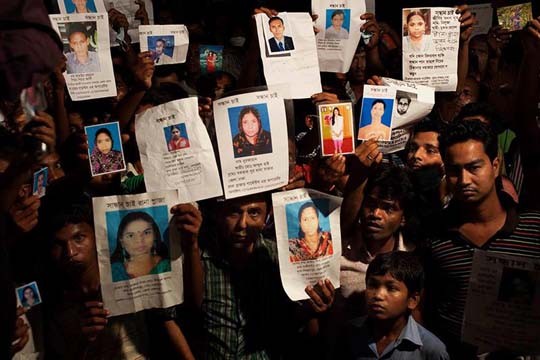
I am writing on behalf of the Canadian Labour Congress Pensioners' and Retirees' Association to protest the weak response from the Canadian labour movement to the factory fires in Bangladesh, and to the recent building collapse there, which killed over 1,100 workers. While there have been quite a few online statements of outrage and solidarity, some fundraising efforts, and support for LabourStart's online campaign, there have been few, if any, attempts to take part in a public debate, for instance, on the talk shows and on such programs as Rex Murphy's CBC radio Cross-Country Checkup. The result has been that the most important policy issues - health and safety standards and collective bargaining rights - barely figured in the public debate, and Canadian labour made no contribution to the work of the international trade union bodies and the International Labour Organization (ILO) to prevent this sort of thing from ever happening again.
A generation ago, such a weak response would never have happened. Since then, unions and central bodies have run down their provision for health and safety, with a resulting decline in rank-and-file activism and lack of pressure to make a public fuss whenever a tragedy of the magnitude of Bangladesh occurs. The Day of Mourning, April 28, which Canada has made into an event world-wide, used to be a forum to draw attention to workplace hazards, occupational health hazards in particular, and what we proposed to do about them, with the motto: "Fight for the Living." I hope that, across the country, the day has not degenerated into an annual ritual for quoting WCB figures on the number of workplace fatalities, with no reference to the epidemic of occupational disease or the need to redirect our activism.
Dave Bennett
Secretary, Canadian Labour Congress Pensioners' and Retirees' Association
LETTER IN RESPONSE: FROM JORGE GARCIA-ORGALES
I am not sure if Dave Bennett's letter is accurate. I base my opinion on two very different facts:
1) I don't know about the CLC and other unions, but, as someone who works for the United Steelworkers, I do know that our union has been an active part of the Maquila Solidarity Network since its inception, and it has been campaigning vigorously on behalf of the Bangladesh garment workers. (The Maquila Solidarity Network, for those who don't know, is a labour and women's rights organization that "supports the efforts of workers in global supply chains to win improved wages and working conditions and a better quality of life."
We have not only contributed heavily, financially, to their existence, but we also have members on their board of directors; participated in many of their delegations; supported and distributed their publication, etc. The same can be said for United States: the Steelworkers there are the main supporter of Labor Rights, one of the most outspoken international groups, quoted often in the media. Finally, the Steelworkers were one of the unions responsible for getting the Textile International into IndustriALL (one of the two Global Unions that signed the international agreement with the retailers). I am trying to say that, while we can be accused of contracting out this fight to MSN and Labor Rights and others, we are not absent or disinterested. Again, I don't know about other unions.
(2) The ideological control of the mainstream media shows in the kind of coverage given about the signing of the international agreement in the wake of the factory building's collapse. All the mainstream media are talking about "retailers signing the agreement," "H&M leading the retailers in signing the agreement," "Loblaws thinking about signing the agreement," etc. In a few cases, you might get somebody quoting a Maquila Solidarity Network spokeperson. IndustriALL and UNI (the two global unions that are the counterpart of the agreement) are barely mentioned, and they are the ones who had the text of the agreement ready for more than one year before the factory collapse, with no similar and sudden interest shown from retailers at the time.
To be clear, I don't believe any mainstream editor is telling their journalists how to cover the story. Ideology is simpler, and deeper. For the journalists, H&M and Loblaws are familiar: the know about them, they see their ads, they shop in their stores. On the other hand, IndustriALL and UNI are nobodies to them: nobody knows about them, so why would it be important to mention them.
As is the case in much of our history, it seems workers need to die to make a difference. This agreement is one of the major wins for labour in the era of globalization. I feel that, instead of claiming our rightful place in the story, we are getting distracted by right-wing ideology and
internal discontent.
I am sure there is some truth in Dave's comments. But I am more worried about the Canadian Labour Congress losing their staff in the international department due to CIDA cuts and so being unable to be part of a real global fight, than making statements about Bangladesh. Statements,
speeches and calls to talk shows are easy and empty if you don't follow them with real action.
Jorge Garcia-Orgales
United Steelworkers Global Affairs and Workplace Issues Department, and Our Times Advisory Board member
Dave Bennett, former national director of health, safety and the environment for the Canadian Labour Congress, is now secretary of the CLC Pensioners' and Retirees' Association.
Jorge Garcia-Orgales works in the United Steelworkers Global Affairs and Workplace Issues Department. He is also a member of Our Times' Advisory Board.










